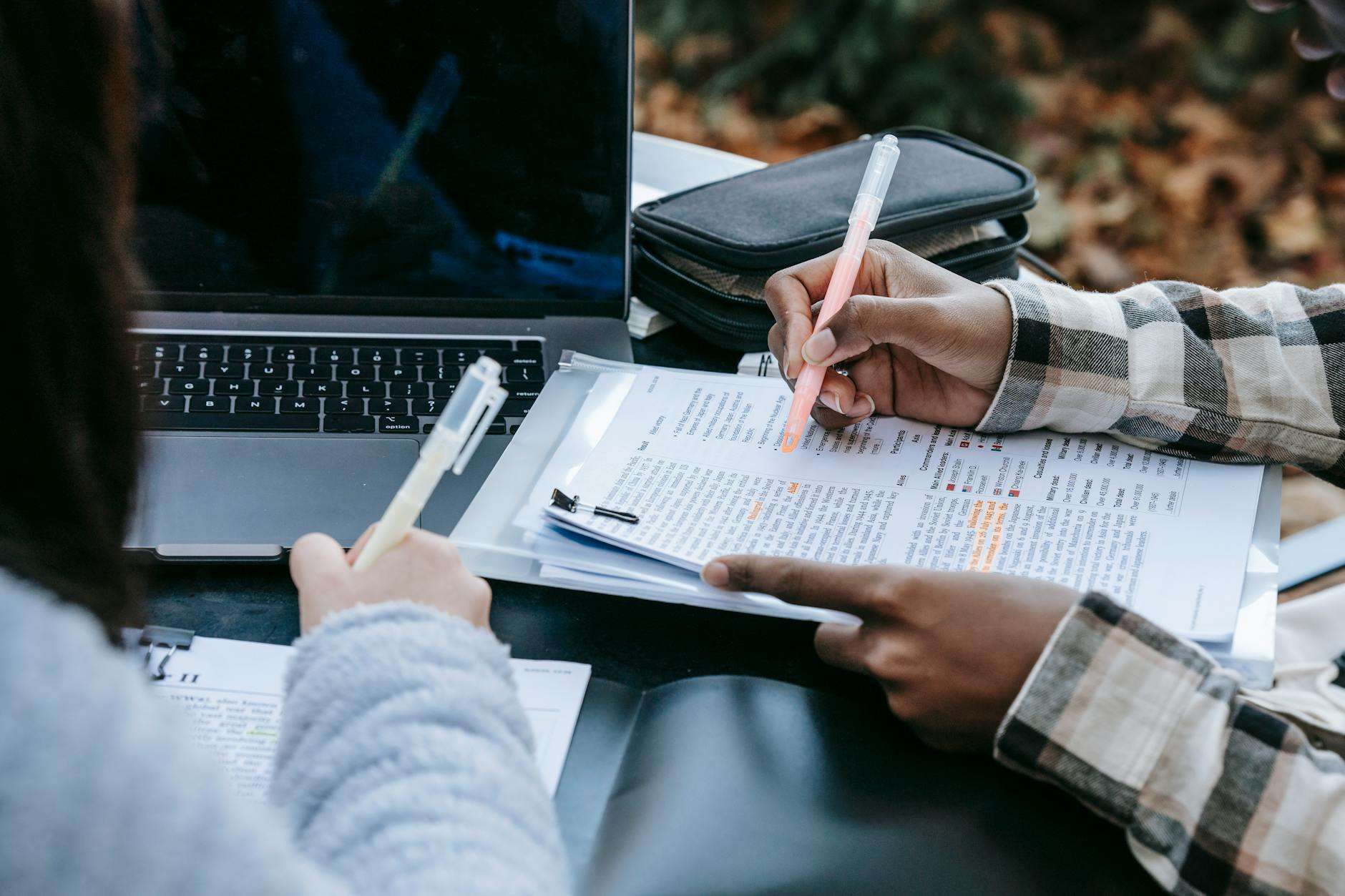Have you ever felt like you’re studying for hours on end, but the information just won’t stick? 🤔 You’re not alone. Many students struggle to make the most of their study time, leaving them frustrated and overwhelmed. But what if there was a secret weapon that could transform your learning experience and help you become your own best teacher?
Enter metacognition – the powerful ability to think about your thinking. By harnessing this skill, you can unlock a world of smarter studying techniques that will revolutionize the way you learn. Imagine being able to effortlessly absorb information, retain it for longer, and apply it with confidence. With metacognition, you’ll not only improve your grades but also develop a lifelong love for learning.
In this blog post, we’ll dive deep into the world of metacognition and reveal how you can leverage this game-changing strategy to supercharge your studying. From assessing your current learning methods to implementing self-questioning techniques and optimizing your learning environment, we’ll guide you through every step of the process. Get ready to discover the secrets of smarter studying and unlock your full potential as a learner! 🚀
Understanding Metacognition

Definition and importance
Metacognition is your ability to think about your own thinking processes. It’s like having a bird’s-eye view of your learning journey. This skill is crucial for becoming an effective learner, as it allows you to monitor, evaluate, and adjust your study strategies in real-time.
The importance of metacognition in learning can’t be overstated. Here’s why:
- Increases self-awareness
- Improves problem-solving skills
- Enhances critical thinking
- Boosts academic performance
- Promotes lifelong learning
| Without Metacognition | With Metacognition |
|---|---|
| Passive learning | Active engagement |
| Limited self-reflection | Continuous self-assessment |
| Fixed study habits | Adaptive learning strategies |
| Surface-level understanding | Deep comprehension |
How it enhances learning
Metacognition acts as a powerful catalyst for your learning process. By employing metacognitive strategies, you can significantly improve your ability to absorb, retain, and apply new information. Here’s how:
- Planning: You set clear learning goals and choose appropriate strategies.
- Monitoring: You track your progress and identify areas of confusion.
- Evaluating: You assess the effectiveness of your learning methods.
- Adjusting: You modify your approach based on your evaluations.
The role of self-awareness in studying
Self-awareness is the cornerstone of metacognition. It involves recognizing your strengths, weaknesses, and learning preferences. By developing self-awareness, you can:
- Identify knowledge gaps
- Recognize when you’re struggling
- Choose study techniques that work best for you
- Manage your time more effectively
- Stay motivated throughout your learning journey
Remember, becoming your own best teacher starts with understanding how you learn. Now that you grasp the concept of metacognition, let’s explore how to assess your current learning strategies.
Assessing Your Current Learning Strategies

Identifying strengths and weaknesses
You’re on the path to becoming your own best teacher, and the first step is to take a good look at your current learning strategies. Start by identifying your strengths and weaknesses. Consider the subjects or skills you excel in and those that challenge you. Are you a visual learner who thrives with diagrams and charts, or do you prefer auditory learning through lectures and discussions?
To help you assess your learning profile, use this simple self-evaluation table:
| Learning Area | Strength (1-5) | Weakness (1-5) |
|---|---|---|
| Visual learning | ||
| Auditory learning | ||
| Reading/Writing | ||
| Kinesthetic learning | ||
| Group study | ||
| Self-study |
Fill in this table honestly, rating each area from 1 (very weak) to 5 (very strong). This will give you a clear picture of where you excel and where you need improvement.
Recognizing ineffective study habits
Now that you’ve identified your strengths and weaknesses, it’s time to spot those study habits that might be holding you back. Some common ineffective habits include:
- Cramming before exams
- Passive reading without engagement
- Multitasking while studying
- Studying in distracting environments
- Not taking breaks
Make a list of your current study habits and critically evaluate which ones might be ineffective. Be honest with yourself – recognizing these habits is the first step to improving them.
Setting realistic learning goals
With a clear understanding of your strengths, weaknesses, and ineffective habits, you’re now ready to set realistic learning goals. Remember, the key is to make these goals SMART:
- Specific
- Measurable
- Achievable
- Relevant
- Time-bound
For example, instead of setting a vague goal like “improve my math skills,” try something like “solve 10 algebra problems correctly each day for the next two weeks.” This approach gives you a clear target and a way to measure your progress.
Now that you’ve assessed your current learning strategies, you’re better equipped to develop effective metacognitive techniques that will supercharge your studying.
Developing Effective Metacognitive Techniques
Planning your study sessions
To become your own best teacher, you need to master the art of planning your study sessions. Start by setting clear, achievable goals for each session. Ask yourself: “What do I want to accomplish today?” This simple question can guide your entire study plan.
Here’s a table to help you structure your study sessions effectively:
| Time | Activity | Goal |
|---|---|---|
| 30 mins | Review previous material | Reinforce key concepts |
| 45 mins | Tackle new content | Understand main ideas |
| 15 mins | Break | Refresh and recharge |
| 30 mins | Practice exercises | Apply new knowledge |
| 15 mins | Summarize and reflect | Consolidate learning |
Monitoring your progress
As you study, regularly check your understanding. Ask yourself:
- Am I grasping the main concepts?
- Can I explain this topic to someone else?
- Where am I struggling?
Keep a study journal to track your progress. Note down areas where you excel and those that need more attention.
Evaluating your understanding
After each study session, take time to evaluate your comprehension. Try these strategies:
- Summarize key points without referring to your notes
- Create concept maps to visualize connections between ideas
- Teach the material to an imaginary student or study partner
- Take practice quizzes to identify knowledge gaps
Adapting your approach
Based on your evaluations, be ready to adjust your study methods. If a particular technique isn’t working, don’t hesitate to try something new. Remember, flexibility is key in metacognitive learning. You might find that certain subjects require different approaches, so be open to experimenting with various strategies until you find what works best for you.
Implementing Self-Questioning Strategies

Pre-study reflection questions
Before diving into your study session, it’s crucial to set the stage for effective learning. By asking yourself targeted questions, you can prime your mind for optimal engagement and retention. Here are some key pre-study reflection questions to consider:
- What do I already know about this topic?
- What are my learning goals for this session?
- How does this material relate to my previous knowledge?
- What challenges do I anticipate in understanding this content?
Use this table to track your responses and monitor your progress over time:
| Question | Your Response | Follow-up Action |
|---|---|---|
| Prior knowledge | ||
| Learning goals | ||
| Connections | ||
| Anticipated challenges |
During-study comprehension checks
As you progress through your study material, it’s essential to regularly assess your understanding. Implement these self-questioning strategies to ensure you’re truly grasping the content:
- Can I explain this concept in my own words?
- How does this idea connect to what I’ve learned previously?
- What examples can I think of to illustrate this point?
- Are there any parts of this material that I’m struggling to understand?
Post-study evaluation prompts
After completing your study session, take time to reflect on your learning experience. These post-study evaluation prompts will help you consolidate your knowledge and identify areas for improvement:
- What were the key takeaways from this study session?
- How well did I achieve my learning goals?
- What strategies worked well for me during this session?
- What areas do I need to review further?
By consistently applying these self-questioning strategies, you’ll become more aware of your learning process and develop the skills to become your own best teacher. Next, we’ll explore how to optimize your learning environment to further enhance your study effectiveness.
Optimizing Your Learning Environment

Creating a distraction-free space
You’ve probably heard the saying, “Out of sight, out of mind.” This principle applies perfectly to creating an ideal study environment. By eliminating distractions, you’ll maximize your focus and productivity. Here’s how you can craft your perfect study sanctuary:
- Choose a quiet location
- Remove electronic temptations
- Declutter your workspace
- Use noise-canceling headphones
- Employ the “Do Not Disturb” sign
Organizing study materials
An organized space leads to an organized mind. You’ll save time and reduce stress by keeping your study materials well-arranged. Consider these organizational strategies:
| Strategy | Benefits |
|---|---|
| Color-coding | Quick identification of subjects |
| Digital filing | Easy access and backup |
| Physical folders | Tangible organization |
| To-do lists | Clear task prioritization |
| Study planner | Long-term goal tracking |
Utilizing technology tools
In today’s digital age, you have a wealth of tech tools at your fingertips to enhance your learning environment. Here are some must-have apps and software:
- Evernote or OneNote for note-taking
- Forest app for focus and time management
- Quizlet for flashcards and self-testing
- RescueTime for productivity tracking
- Grammarly for writing assistance
By optimizing your physical and digital learning spaces, you’re setting yourself up for success. Remember, a well-organized environment not only boosts your efficiency but also reduces mental clutter, allowing you to concentrate fully on your studies.
Mastering Time Management for Smarter Studying

Prioritizing tasks
To master time management for smarter studying, you need to start by prioritizing your tasks effectively. Begin by creating a to-do list and categorizing your tasks based on urgency and importance. Use the Eisenhower Matrix to help you prioritize:
| Urgent | Not Urgent |
|---|---|
| Important | Do first |
| Not Important | Delegate |
Focus on tasks that fall into the “Important and Urgent” quadrant first. By tackling these tasks, you’ll reduce stress and create more time for deeper learning.
Using the Pomodoro Technique
The Pomodoro Technique is a powerful time management method that can significantly boost your productivity. Here’s how you can implement it:
- Choose a task to work on
- Set a timer for 25 minutes
- Work on the task until the timer rings
- Take a short 5-minute break
- Repeat steps 1-4 four times
- After four pomodoros, take a longer 15-30 minute break
This technique helps you maintain focus and prevents burnout by incorporating regular breaks into your study sessions.
Balancing study and breaks
Finding the right balance between study time and breaks is crucial for effective learning. While it might seem counterintuitive, taking regular breaks can actually improve your productivity and retention. Here are some tips for balancing study and breaks:
- Use the 52-17 rule: Study for 52 minutes, then take a 17-minute break
- Incorporate physical activity during breaks to boost energy and concentration
- Use break time for quick review sessions to reinforce learning
Avoiding procrastination
Procrastination can be a major obstacle to effective studying. To overcome this challenge, try these strategies:
- Break large tasks into smaller, manageable chunks
- Set specific, achievable goals for each study session
- Use positive reinforcement to reward yourself for completing tasks
- Identify and eliminate distractions in your study environment
By implementing these time management techniques, you’ll be better equipped to make the most of your study time and achieve your learning goals more efficiently. Now that you’ve mastered time management, let’s explore how to enhance your memory and retention for even more effective studying.
Enhancing Memory and Retention

Active recall techniques
Active recall is a powerful technique that can significantly boost your memory and retention. By challenging yourself to retrieve information from memory, you strengthen neural connections and improve long-term recall. Here are some effective active recall methods you can implement in your study routine:
- Flashcards: Create cards with questions on one side and answers on the other
- Practice tests: Generate and take mock exams on the subject matter
- Teach others: Explain concepts to friends or study groups
- Mind mapping: Draw connections between ideas from memory
| Technique | Benefits | Implementation |
|---|---|---|
| Flashcards | Portable, versatile | Review daily, focus on difficult cards |
| Practice tests | Simulates exam conditions | Create weekly quizzes |
| Teaching others | Reinforces understanding | Schedule study group sessions |
| Mind mapping | Visualizes connections | Draw maps after each study session |
Spaced repetition methods
Spaced repetition leverages the spacing effect to enhance your memory retention. By reviewing information at gradually increasing intervals, you can optimize your study schedule for maximum retention. Here’s how you can incorporate spaced repetition into your learning:
- Use spaced repetition software (SRS) like Anki or SuperMemo
- Create a review schedule with increasing intervals (e.g., 1 day, 3 days, 1 week, 2 weeks)
- Prioritize difficult concepts for more frequent review
- Combine with active recall techniques for enhanced effectiveness
Elaborative rehearsal strategies
Elaborative rehearsal involves processing information more deeply by connecting it to existing knowledge. This technique helps you create stronger, more meaningful memories. Try these elaborative rehearsal strategies:
- Create analogies and metaphors to relate new concepts to familiar ideas
- Generate examples that illustrate the principles you’re learning
- Explain complex topics in your own words, as if teaching someone else
- Connect new information to personal experiences or real-world applications
Mnemonic devices
Mnemonic devices are memory aids that help you encode and recall information more easily. By associating new information with familiar patterns or images, you can significantly improve your retention. Here are some popular mnemonic techniques:
- Acronyms: Create memorable abbreviations (e.g., ROY G. BIV for rainbow colors)
- Acrostics: Form sentences where each word starts with the letter you need to remember
- Method of loci: Visualize information in specific locations along a familiar route
- Rhymes and songs: Set important information to catchy tunes or rhythms
By incorporating these memory enhancement techniques into your study routine, you’ll be well-equipped to retain and recall information more effectively. Next, we’ll explore how cultivating a growth mindset can further amplify your learning potential.
Cultivating a Growth Mindset

Embracing challenges
As you develop a growth mindset, embracing challenges becomes a crucial step in your learning journey. Challenges are opportunities for growth, not obstacles to avoid. When faced with difficult tasks or concepts, approach them with curiosity and enthusiasm. Here’s how you can embrace challenges:
- Set stretch goals that push you out of your comfort zone
- Break down complex problems into smaller, manageable steps
- Celebrate the effort you put into overcoming challenges, not just the outcomes
Learning from mistakes
Mistakes are valuable learning experiences, not failures. Adopt a positive attitude towards errors and use them as stepping stones to improvement. Consider the following strategies:
| Strategy | Description |
|---|---|
| Error analysis | Examine your mistakes to identify patterns and areas for improvement |
| Reflective journaling | Write about your mistakes and what you learned from them |
| Peer discussion | Share your mistakes with classmates to gain different perspectives |
Persevering through difficulties
Persistence is key to mastering any subject. When you encounter obstacles, remind yourself that struggle is a natural part of the learning process. Try these techniques to build resilience:
- Practice positive self-talk
- Visualize yourself overcoming difficulties
- Take short breaks to recharge when facing prolonged challenges
Seeking feedback and support
A growth mindset thrives on constructive feedback and support from others. Don’t hesitate to ask for help when you need it. Here’s how you can make the most of feedback and support:
- Actively seek feedback from teachers, peers, and mentors
- View criticism as an opportunity to improve, not as a personal attack
- Join study groups or find an accountability partner to stay motivated
By cultivating a growth mindset, you’ll become more resilient, adaptable, and open to learning. This mindset will serve you well not only in your studies but also in your personal and professional life. As you continue to develop these skills, you’ll find that your capacity for learning and growth expands, making you a more effective self-directed learner.

By embracing metacognition and implementing the strategies discussed in this post, you can revolutionize your approach to learning. From assessing your current methods to developing effective techniques, asking yourself the right questions, and optimizing your environment, you’re now equipped with powerful tools to enhance your studying process. Remember, mastering time management, improving memory retention, and cultivating a growth mindset are all crucial elements in becoming your own best teacher.
Take the first step today by applying one or two of these metacognitive strategies to your next study session. As you continue to refine your learning approach, you’ll discover newfound efficiency and effectiveness in your academic pursuits. Embrace the journey of self-improvement, and watch as your ability to learn and retain information grows exponentially. Your potential for success is limitless when you harness the power of metacognition.

